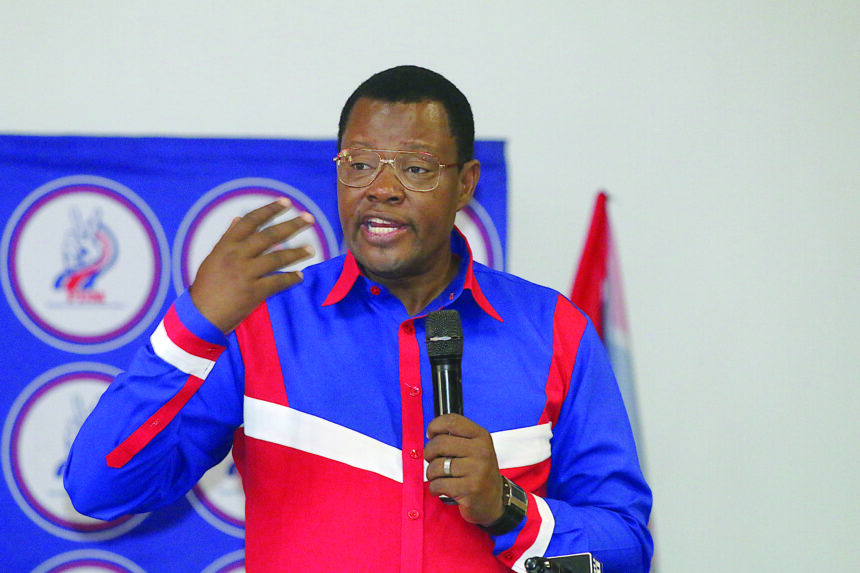Lahja Nashuuta
Political observers have expressed concern over parties that are recycling manifestos, citing lack of fresh ideas and failure to adapt to changing socio-political conditions.
Political parties have been releasing their manifestos in the last few weeks in a bid to win over the hearts of voters.
Various parties, although been on the campaign trail for months, only managed to release their manifestos in September, while others are yet to sell their platform or plans to the electorate.
The Popular Democratic Movement was the first party to release its manifesto.
However, its document has received a fair share of criticism, with some calling it “old wine in a new bottle”, suggesting the party is simply regurgitating and repeating commitments it made five years ago.
Contacted for comment, PDM leader McHenry Venaani, said there is nothing wrong with reiterating the party’s vision as the ruling party failed to address the socio-economic challenges facing the country.
“Why do we need to change the plan, I am the same leader in 2019, and the same leader in 2024, parties are ideologically vested in the ideas.
“What is it that you want to do for people? I can’t be one day, I want to nationalise mines and the next I don’t want to nationalise mines, then I am ideologically bankrupt [and] don’t have a vision.”
“There are a number of elements in the 2019 manifesto that I included in the 2024 manifesto because we are the same party, we are presenting the same vision for the country. If you are telling me that every five years the same party should have a new manifesto, that will not be possible. Unless you are saying that what you intended to do in 2019 was resolved by the ruling party, then we are supposed to focus on something else but for the past years, there was no agricultural modernisation achieved, no employment creation attained.”
The politician further said his party is a focused organisation with a vision.
“In 2019, we envisioned ‘one constituency, one factory’ and we are saying it again because it was not done. We renege on the promise because it’s another year, you renege on the promises if the economic situation has not changed. Of course, we have brought in new elements such as green energy and new oil [discoveries], but the fundamentals of what we want to achieve for the country remain the same. We are consistent in our messaging, true to ourselves and our vision for this country remains intact,” Venaani argued.
Fresh ideas
Political commentator Ndumba Kamwanyah said various manifestos, including that of the current official opposition, are bombarded with old promises and have fallen short of fresh ideas, especially in terms of new frontiers such as green hydrogen and the discovery of oil and gas.
“In an election period where parties are expected to show how they will tackle current and future challenges, innovation in policy proposals could energise the party’s base and attract undecided voters,” Kamwanyah said.
He added that the recycling of manifestos raises significant concerns about innovation and adaptability in their policy proposals.
In the 2019 manifesto, PDM promised to intensify job creation, reduce the unemployment rate, build houses and expand agricultural production, if elected to power.
Furthermore, the party promised to trim the executive to only 15 ministers and four deputy ministers to drastically reduce government expenditure and provide more resources to people.
Furthermore, the party promised to reduce the urban housing backlog by 30% by 2029, through their ‘one Namibian, one Plot’ policy proposal.
Other promises that were lifted verbatim from its previous manifesto include the promise to increase the budgetary allocation for agriculture to 10% in line with the Malabo Protocol, to achieve agricultural modernisation and mechanisation and to tackle corruption and crime by tightening legislation and improving policing service.
Kamwanyah has cautioned all political parties that the reusing of the same manifestos suggests that parties may not have adequately responded to the evolving needs of Namibians since 2019.
“Over the past five years, the country has faced new challenges such as the post-Covid economic recovery, youth unemployment, and environmental crises like droughts and floods. A manifesto that fails to address these new realities could be seen as out of touch with the electorate’s current concerns,” he said.
Kamwanyah further said presenting the same promises could lead to voter fatigue, where the electorate may feel that the party is recycling old ideas that failed to deliver significant change in the past.
“This can decrease trust in the party’s ability to govern and reduce voter turnout or support, especially if voters believe the promises are unlikely to be fulfilled,” he said.
The commentator further said “Repeating the manifesto could raise questions about their track record and accountability, highlighting gaps between what was promised and what was delivered. If little progress has been made, the public may view the party as ineffective.”
“If indeed the manifesto of the PDM is the same as the one of 2019, then it’s a clear sign that the party is not keeping up with the current political issues,” said political commentator Natjirikasorua Tjirera.
He further said while the party may argue in their defence that the issues they raised in 2019 were not addressed by the government and as a result, they need to raise the same issues again, he maintained that political dynamics changed and there is a need for a party as huge as PDM to keep up with the times and present new and modern solutions to problems that are facing the nation.
“Presenting a replica of their previous mandates is lazy politics, and the PDM should tell the nation why they are taking them for a ride,” Tjirera said.


